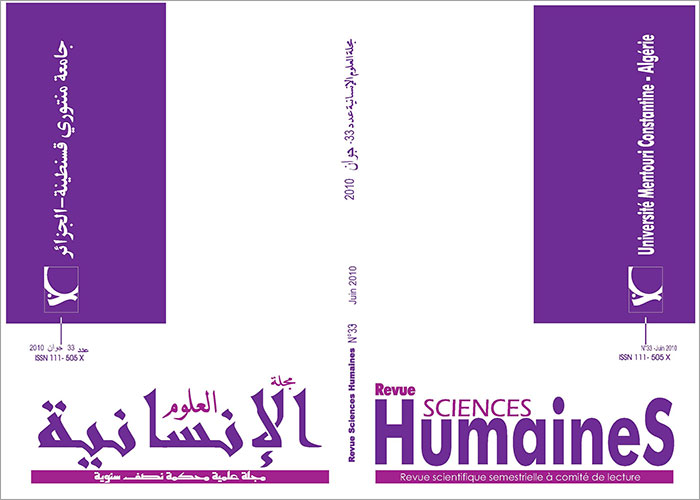التصورات الابستمولوجية لتعلم المفاهيم العلمية لدى معلمات الصفوف الثلاثة الأولى وعلاقتها بمستوى خبرتهن التدريسية
Abstract
هدف هذا البحث إلى كشف التصورات الابستمولوجية لدى معلمات الصفوف الثلاثة الأولى وعلاقتها بمستوى خبرتهن التدريسية. ولتحقيق ذلك، تم تطوير استبانة لقياس التصورات الابستمولوجية لتعلم المناهج العلمية تكونت من (27) فقرة تم التحقق من صدقها وثباتها. طبقت الاستبانة على عينة تألفت من (65) معلمة من معلمات الصفوف الثلاثة الأولى في مديرية التربية والتعليم بعمان الثانية. وأظهرت نتائج تحليل البيانات عدداً من النتائج منها: شيوع عدد من التصورات الابستمولوجية الخاطئة لدى عينة البحث، كما أظهرت عدم وجود فروق دالة احصائياً للتصورات الابستمولوجية لعينة البحث تعزى لمستوى خبرتهن التدريسية سوى في دور الكتاب المدرسي المقرر ولصالح ذوات الخبرة الطويلةDownloads
References
القادري، سليمان (2005). "دور الابستمولوجيا في تحسين تعلم المفاهيم الفيزيائية" ، مجلة المنارة ، جامعة آل البيت، المفرق ، مجلد(11) عدد(1)، ص ص 217-254.
- Airasian, P. W. & Walsh, M. E. (1997). Constructivist Cautions. Phi Delta Kappan, 78: 444-449.
- Archer, J. (2000). Teachers’ Beliefs about Successful Teaching and Learning in English and Mathematics. Paper presented at the Annual Meeting of the Australian Association for Research in Education (Sydney, Austalia, December 4-7, 2000).
- Bryan, L. A., Abell, S. K. & Anderson, M. A. (1996b, March). Preservice teachers thinking about science teaching and learning: Experiences, frames and tensions. Paper preseted at the Annual Meeting of the Nationa Association for Research in Science Teaching, St. Louis, MO.
- Buell, M., Alexander, P. and Murphy, P. (2002). Beliefs about schooled knowledge: Domain specific or domain general? Contemporary Educational Psychology, 27: 415-440.
- Bullough, R. V. (1994). Personal history and teaching metaphors: A self-study of teaching as conversion. Teacher Education Quarterly, 21(1): 107-120.
- Chan, K. (2007). Hong Kong teacher education students’ epistemological beliefs and their relations with conceptions of learning and learning strategies. The Asia Pacific Education Researcher, 16(2), 199-214.
- Czerniak, M. C., Lumpe, A. T., & Haney, J.J. (1999). Science teachers’ beliefs and intentions to implement thematic units. Journal of Science Teacher Education, 10(2): 123-145.
- Genter, D. and Stevens, A. L. (Eds.) (1983). Mental models. Hillsdale, NJ. Lawrance Erlbaum Associates.
- Greeno, J. (1989). A perspective on thinking. American Psychologist, 44, 134-141.
- Hancock, Elizabeth S.& Gallard, Alejandro J. (2004) Preservice Science Teachers' Beliefs about Teaching and Learning : The Influence of K-12 Field Experiences. Journal of Science Education,15(4), 281-291.
- Helighen,F, Epistemological Constructivism, Principa, Cyberetica retriered at(15/3/2005) at: http:// pespm1, vab, ac, be/CONSTRUC.
- Hofer, J. P. & Pintrich, P. R. (1997). Assessing epistemological theories: beliefs about knowledge and knowing and their relation to learning. Review of Educational Research, 67, 88-140.
-Kardash, C. & Scholes, R. (1996). Effects of preexisting beliefs, epistemological beliefs, and need for cognition on interpretation of controversial issues. Journal of Educational Psychology, 88(2): 260-271.
- Kitchener, K. (1983). Cognition, metacognition, and epistemic cognition. Human Development, 26, 222-232.
- Korthagen, F. & Kessels, J. (1999). Linking Theory and Practice: Changing the Pedagogy of Teacher Education. Educational Researcher, 28, 4-17.
- Lising, Laura & Elby, Andrew(2004) .The impact of epistemology on learning: a case study. American Journal of Physics,74(4), pp. 253-367.
- Nespor, J. (1987). The Role of Beliefs in the Practice of Teaching. Journal of Curriculum Studies, 19: 317-328.
- Niessen, Theo; Abma , Tinke, ;Widdershoven,Guy; Van der Vleuten, Cees and Akkerman, Sanne (2008) Contemporary Epistemological Research in Education: Reconciliation and Reconceptualization of field. Theory & Psychology,18(1),27-45.
- Nist S. & Holschuh, J. (2005). Practical Applications of the Research on Epistemological Beliefs. Journal of College Reading and Learning, 35(2), 84-92.
- Palmer, B. & Marra, R. (2004). College student epistemological perspectives across knowledge domains: A proposed grounded theory. Higher Education, 47: 311-336.
- Perry, W. (1968). Patterns of development in thought and values of students in a liberal arts college: A validation scheme. Cambridge, MA: Bureau of Study Counsel, Harvard University. ED 024315.
- Prawat, R. (1992). Are changes in views about mathematics sufficient? The case of a fifth grade teacher. Elementary School Journal, 93(2),195-212.
- Raizen, S. A.,& Michelsohn, A. M. (EDs) (1994). The future of science in elementary schools: Educating Prospective Teachers. San Francisco: Jossey-Bass.
- Ryan, M. (1984). Monitoring text comprehension: Individual differences in epistemological standards. Journal of Educational Psychology, 76, 248-258.
- Scheiber, J. & Shinn, D. (2003). Comparisons of beliefs of community college students and their learning processes. Community College Journal of Research and Practice, 27,699-710.
- Shomer, M. (1990). Effects of beliefs about the nature of knowledge and learning among post-secondary students. Research in Higher Education, 34,355-370.
- Schommer, M. (1993). Epistemological development and academic performance among secondary students. Journal of Educational Psychology, 85, 406-411.
- Schommer-Aikins, M.; Duell, O. & Barker, S. (2003). Episetmological beliefs across domains using Biglan’s classification of academic disciplines. Research in Higher Education, 44, 347-467.
- Schommer, M.; Crouse, A. and Rhodes, N. (1992). Epistemogical beliefs and mathematical text comprehension: Believing it is simple doesn’t make it so. Journal of Educational Psychology, 84(4): 453-443.
- Simpson, M. and Nist, S. (1997). Perspective on learning history: A case study. Journal of Literacy Research, 29, 363-395.
- Songer & Linn, (1991). How do students views of science influence knowledge integration? Journal of Research in Science Teaching, 28: 761-784.
- Tsai, Chin-Chung (2005) Developing a Multi- Dimensional Instrument for Assessing Students' Epistemological Views Toward Science. International Journal of Science Education,27(13),1621-1638.
- Tsai, Chin-Chung (2002) Nested Epistemologies: Science Teachers' Beliefs of teaching, Learning and Science. International Journal of Science Education,24(8),771-783.
- Ullrich, W. (1999a). Integrative teacher education curriculum. Paper presented at the Annual Meeting of the National Middle School Association. Orlando, FL..
- Ullrich, W. (1999b). Depth Psychology, critical pedagogy, and initial teacher preparation. Teaching Education, 10(2),17-33.
- Wilson, B. (2000). The Epistemological Beliefs of Technical College Instructors. Journal of Adult Development, 7(3),179-186.












